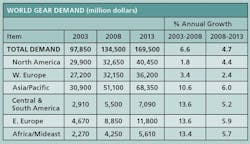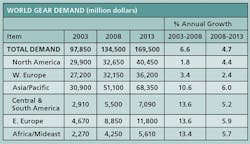Gear Demand Could Climb 5%
Global demand for gears and gear assemblies is forecast to climb almost 5% annually through 2013 to $170 billion. Market gains will be driven by rising motor vehicle production, ongoing economic growth, increased manufacturing output and a shift in the product mix toward more expensive, energy-efficient units such as seven- and eight-speed automatic transmissions, according to “World Gears,” a study from the Freedonia Group (www.freedoniagroup.com). Demand in developing parts of Asia, Eastern Europe, the Africa/Mideast region and Central and South America will outpace product sales in the U.S., Western Europe and Japan.
China and India will register some of the strongest market advances, according to the study. China is expected to account for one-third of all additional gear demand through 2013 and will surpass Japan to become the second largest national market behind the U.S.


